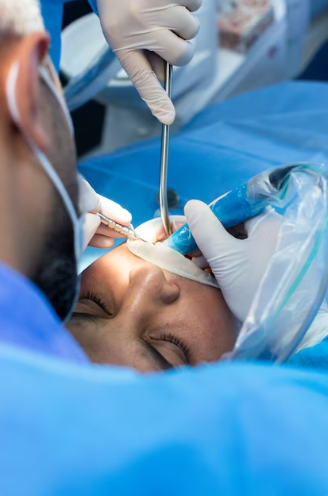Orthognathic Surgery
Jaw surgery, often referred to as orthognathic surgery, addresses jaw bone misalignments, facilitating the alignment of jaws and teeth to enhance both functionality and aesthetics.
These alterations can positively impact facial expressions as well. When orthodontics alone can’t resolve jaw issues, jaw surgery becomes a viable consideration.
Typically, braces are applied before and after the surgery to ensure comprehensive healing and alignment. Your treatment approach is collaboratively determined by your dentist and oral and maxillofacial surgeon.

Symptoms
Orthognathic surgery, while beneficial, can bring about several common symptoms as part of the recovery process. These include:
- Irregular positioning of your teeth.
- Alterations in your facial aesthetics.
- Regularly biting your inner cheeks or tongue.
- Unease while chewing or biting.
- Modifications in speech, potentially lead to the development of a lisp.
- Breathing predominantly through your mouth instead of your nose.
When to access Medical Care
It’s advisable to seek medical care for orthognathic surgery when you experience:
Malocclusion: If you have misaligned teeth or jaws that affect your bite and oral function.
Facial Imbalance: When you notice significant asymmetry between your facial features, particularly the jaws and cheeks.
Chewing Discomfort: If you encounter discomfort or difficulty while chewing, biting, or speaking.
Breathing Issues: If breathing through your mouth becomes predominant due to jaw misalignment.
Orthodontic Concerns: When orthodontic treatments alone are insufficient to address your jaw issues.
Speech Changes: If your speech is affected by jaw misalignment, leading to communication difficulties.
Facial Aesthetic Concerns: When you’re unhappy with the appearance of your cheeks or jaws in relation to the rest of your face.
- Jaw Stiffness: Stiffness in the jaw area is a common manifestation, often making it challenging to move the jaw normally.
- Numbness and Bruising: Bruising and numbness on the face can result from the impact of the injury and the subsequent inflammation. This can be concerning and indicate possible nerve involvement.
- Dental-related Discomfort: The injury might cause dental-related issues such as numbness in the gums or teeth that feel loosened due to the trauma.
Prompt medical attention can help determine the cause and guide appropriate treatment. If in doubt, don’t hesitate to reach out to us.
Determinants of risk
Malocclusion is not associated with any specific risk factors.
Recovery process
Recovery duration varies, contingent on factors like patient characteristics, chosen procedure, and the extent of severity.
Why entrust your care to us?
At Steps 2 Cure, our foundation of trust is built upon several key pillars that ensure your confidence in our services and expertise. Our team comprises highly qualified professionals with extensive experience in their respective fields. Their knowledge and skills enable us to offer you the best possible care and solutions for your medical needs. We understand that each individual is unique, and so are their healthcare requirements.
That’s why we prioritize tailoring our treatments and approaches to your specific circumstances, ensuring that you receive care that is truly designed for you. You are at the heart of everything we do. Your comfort, concerns, and aspirations guide our efforts. Our compassionate approach ensures that you feel valued and supported throughout your healthcare experience.
To commence the treatment procedure, you can start by forwarding your questions via WhatsApp at (+91 99xxxxxxxxx) or by sending an email to care@steps2cure.com. Our team will ensure a swift response to your queries.
Orthognathic Surgery
Still have a Query?
Your health and peace of mind matter to us, and we’re dedicated to addressing any inquiries you may have with care and expertise. Feel free to reach out.

